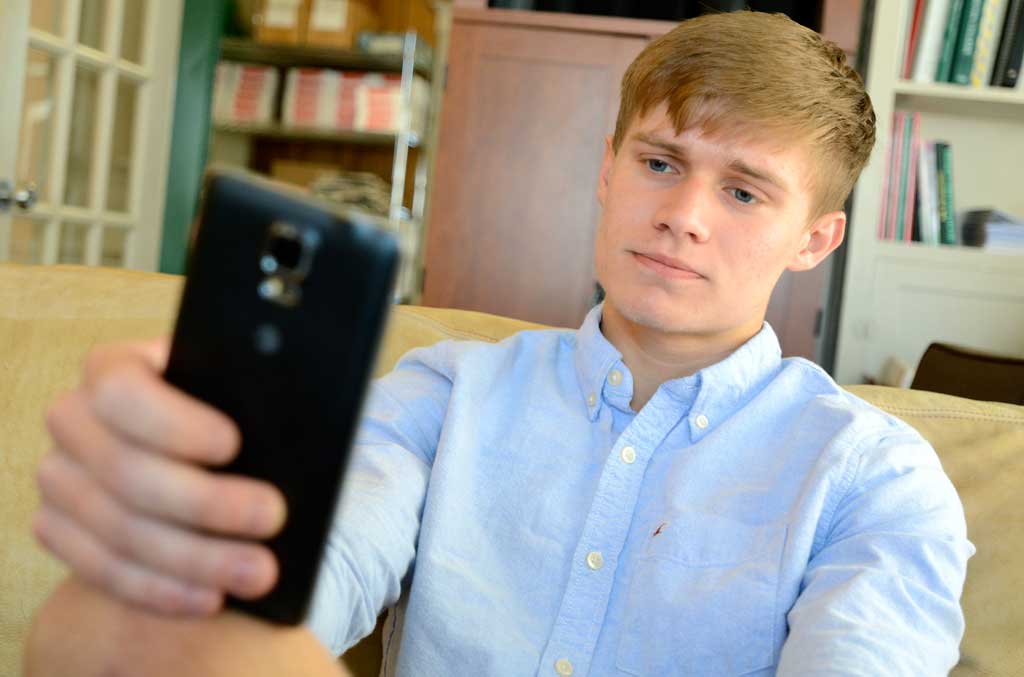Student: 'Media are our relationships, not just a means to them'
A class of Wilmington College students took a look at how the nation’s obsession with social media is, by some measure, preventing them from living their lives both in person and in the present.
(PICTURED) Freshman Jason Altmayer checks his phone for recent text messages and social media posts.
Corey Cockerill had her Communication Arts 131 class participate in a 24-hour media exclusion project in which they not only refrained from watching television, playing musical devices and listening to the radio, but also they could not speak or text on their cell phones, surf the Internet or engage in social media applications.
That’s right — no texting, Tweeting, Instagram, Snapchat or Facebook. No Android, iPad, iPod or iPhone. Ay yi yi.
Cockerill, associate professor of communication arts and agriculture, said the students kept a journal in which they reflected upon their feelings and reactions both during and after the daylong media blackout.
She believes their responses are very telling and “may lend insight into the impact of social media on student quality of life and educational performance.”
Some of the students’ reactions included: “We really don’t have conversations anymore. Now we have to make them.” “We experience the illusion of privacy. But, really, we’re telling our deepest secrets to machines.” “I’m realizing now that we are lazy and depend on technology to do our work, solve our problems and deliver to us endless entertaining media.”
Another student gained insight into the narcissistic phenomenon that is the “selfie” photograph: “Pictures certainly allow you to remember a moment. But, why do we want to capture moments in which we’re doing nothing but holding up our arms in front of our faces?”
Some realized how being without social media significantly changed their daily routine, not to mention how the 24-hour scenario gave them withdrawal symptoms.
“I had to animate myself more than normal because I didn’t have my emojis.” “That day my friends and I made real plans, rather than what I call ‘hectic moments in groups.’” “Aimless scrolling has become an important wake-up and go-to-sleep process.”
Speaking of sleep, one student commented, “I think phones are the reason people have sleep disorders. They keep you from falling asleep, and give you anxiety about waking up and checking back in.” “Normally I spend the day walking around in a fog, like half asleep.”
“Media makes my mind numb.”
Once they were not intently viewing their phones, students observed how others were obsessed with the devices. “I actually saw parents on the phone, even while swimming with their kids at an indoor water park.”
Also, not having constant access to media appeared to enhance interpersonal interactions. “While doing this project, my communication expanded, and not just with people with whom I am comfortable. I even talked to strangers!”
Another gained insight into a cause of anxiety. “I quickly realized it wasn’t using social media that was causing my stress; it was me using social media that caused it.” “We should do this media exclusion thing on vacations and dates.”
A class member realized how smart phones “delay my work just as much as it interrupts it” while another offered the troubling exclamation that, “Media are our relationships, not just a means to them. I realized I really miss my friends.”
One student spoke of not having to deal with annoying people on Facebook. “It was a relief not to have to read about everybody’s brags, and to have to then brag in return.”
At least for 24 hours.

WC Class’ Media Blackout Shines Light on Nation’s Social Media Obsession
Communication Arts
Published on